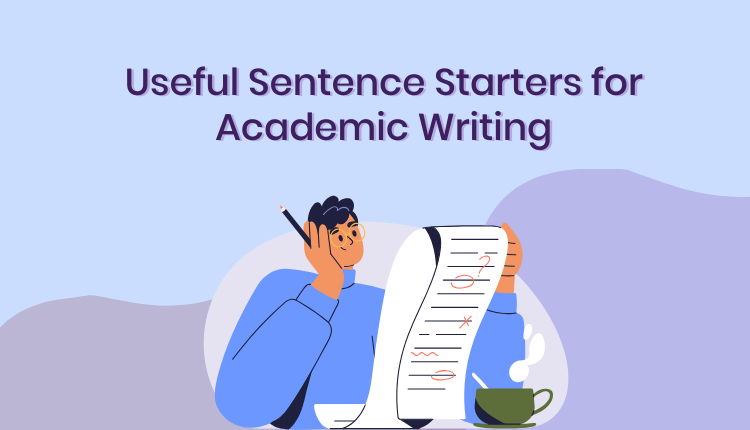Introduction
Writing an academic essay always seems like a daunting task, mainly because you are not sure about the right words to convey your thoughts. That is where sentence starters come in, proving to be your guiding lights that assist you in walking through your ideas and explaining them in the most effective manner. Whether you’re presenting a strong argument or consolidating major points, you’ll be able to make a big difference in your writing flow by knowing how to start each sentence.
Let’s discuss some effective essay sentence starters and the use of Trinka’s paraphrasing tool that will take your academic writing to the next level and make it clearer and more cohesive.
Why are sentence starters useful
Sentence starters are essential tools in academic writing. They help guide readers through your arguments, making complex ideas more digestible. By using varied phrases, you maintain reader interest and enhance clarity.
In addition, good sentence starters can create links between ideas and paragraphs. It makes the sequence of thoughts logical that enhances the overall essay coherence. You can highlight main ideas while transitioning between them in a seamless manner with the proper beginnings.
Introduction sentence starters for essays
Starting an essay well is important in grabbing your reader’s interest. Powerful introduction sentence starters can also set the tone for your whole work. Opening sentences such as “This essay will examine…” or “The aim of this analysis is to…” immediately let readers know what they are in for.
Another good tactic is to ask an interesting question. For instance, “Have you ever stopped to think about why…?” This involves readers from the first sentence and makes them critically think as they explore your case.
Conclusion sentence starters
Finishing your essay on a high note is important. Conclusion sentence starters may assist in driving home your key arguments as well as giving closure. Phrases such as “In summary,” or “To conclude,” present to the reader the main points that have been presented in your writing.
You may also use alternatives like “In conclusion,” or “This makes us think that.” Not only do these alternatives mark the end, but they also add importance to your last words, making a lasting impression on your audience.
Good sentence starters for comparisons
When making comparisons in your writing, it is best to be clear. Begin with “Similarly,” or “In contrast,” to lead readers through your analysis. These initiators serve to effectively light up similarities and differences.
You may also employ phrases like “On the other hand,” or “Likewise,” to strengthen your argument. These transitions allow the reader to follow through smoothly while creating links between ideas, making your essay’s overall narrative richer.
Good sentence starters for sequences or lists
As you organize sequences or lists in your essay, transparent sentence initiators may improve readability. Words “first,” “second,” and “third” allow readers to follow your points smoothly. You can also use “to begin with,” supplemented with other words like “subsequently” and “finally” to produce logical progression.
Another good method involves words such as “in addition to,” which present additional ideas while still being coherent. Applying these resources assists in organizing thoughts linearly, thus enabling your audience to find it simple to trace the sequence of ideas in your writing.
Effective sentence starters for expansion or presenting additional points
If you need to add depth to your argument, effective sentence starters are very important. Phrases such as “Furthermore,” and “In addition,” indicate that you are adding to something previously said. Such transitions enable readers to trace your line of thinking without a hitch.
You can also use expressions such as “Moreover,” or “Additionally,” to introduce another layer of insight. Such starters enhance the flow of your writing while clearly indicating that you’re expanding on an existing point, keeping the reader engaged and informed throughout your essay.
Good sentence starters to show uncertainty or doubt
When it comes to complicated issues, uncertainty is to be expected. Applying sentence starters that capture this ambiguity can make your scholarly writing better. Sentences such as “It might be argued that” or “There is some skepticism regarding,” enable you to raise contrasting arguments without taking a stance.
Also, statements like “This indicates a possibility that,” or “One would wonder if,” show doubt and encourage further investigation. These statements are particularly handy in analytical essays where the application of critical thinking is required for detailed discussions.
How Trinka.ai Can Help
Trinka is an excellent tool for improving your school writing. In addition to correcting grammar and punctuation, it enhances clarity and interest in your essays. With the Trinka Paraphrasing Tool, you can edit your sentences to present ideas in a more engaging and concise manner. The AI-powered recommendations enable you to tighten sentence starters and reinforce your arguments, making them more convincing.
Trinka also offers contextual feedback according to academic standards, so your sentence starters become more effective and engaging to readers. Through this tool, you’ll greatly improve your writing and express complicated ideas with ease.
Conclusion
By increasing organization and clarity, a solid collection of essay sentence starters can significantly improve your university writing. The correct words improve your work, whether you’re introducing concepts, drawing comparisons, or voicing skepticism.
Writing becomes easier and more pleasurable with the help of these starters, which guarantee consistency and fluid flow. To ensure flawless execution every time, use Trinka’s Paraphrasing Tool to polish your sentences for impact and precision.
Use Trinka and well-written sentence starters to effectively and concisely express your ideas in your academic writing.

